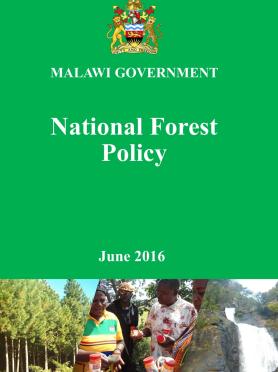Malawi National Forest Policy 2016
Malawi National Forest Policy 2016
The Government of Malawi recognizes the invaluable contribution of forests and trees in improving socio-economic and environmental benefits. In Malawi, both natural and man-made forests play an important role in providing basic human needs such as shelter, food, fodder, fibre, energy and pharmaceuticals. Forests also contribute to the national economy by supporting agriculture which is the mainstay of the national economy through controlling soil erosion, improving soil fertility and regulating water flow.
The Government of Malawi approved a National Forest Policy in February, 1996, in response to the democratization and environmental conditions in the country. Emerging issues and lessons learnt in the implementation of the 1996 policy have necessitated revision to meet the current challenges and address emerging climate change issues such as Payment for Ecosystem Services (PES), Reduced Emissions from Deforestation and Forest Degradation (REDD+), Clean Development Mechanisms (CDM), HIV and AIDS. The Government of Malawi further noted that over the years most policies that impact on the forestry sector had been revised, consequently, there is need to harmonize the policies for efficient implementation.
The goal of the National Forest Policy is to improve provision of forest goods and services to contribute towards sustainable development of Malawi through protection and conservation of forest resources. The policy aspires to control deforestation and forest degradation. The policy promotes strategies that will contribute to increased forest cover by 2% from the current 28% to 30% by 2021, and sustainable management of existing forest resources.
The National Forest Policy takes a holistic approach to sustainable forest management. It adequately addresses issues of forests and water; climate change; food security; HIV and AIDS; gender and equity; wealth creation; biodiversity and Payments for Ecosystem Services (PES); Reduced Emissions from Deforestation and Forest Degradation (REDD+) and Clean Development Mechanisms (CDM). The National Forest Policy recognizes among others the importance of creating an enabling environment for participation of all stakeholders including Public, Private, Civil Society, Non- Governmental Organizations (NGO), Communities, and Academia in collaboration with international community in the management of forest resources.

